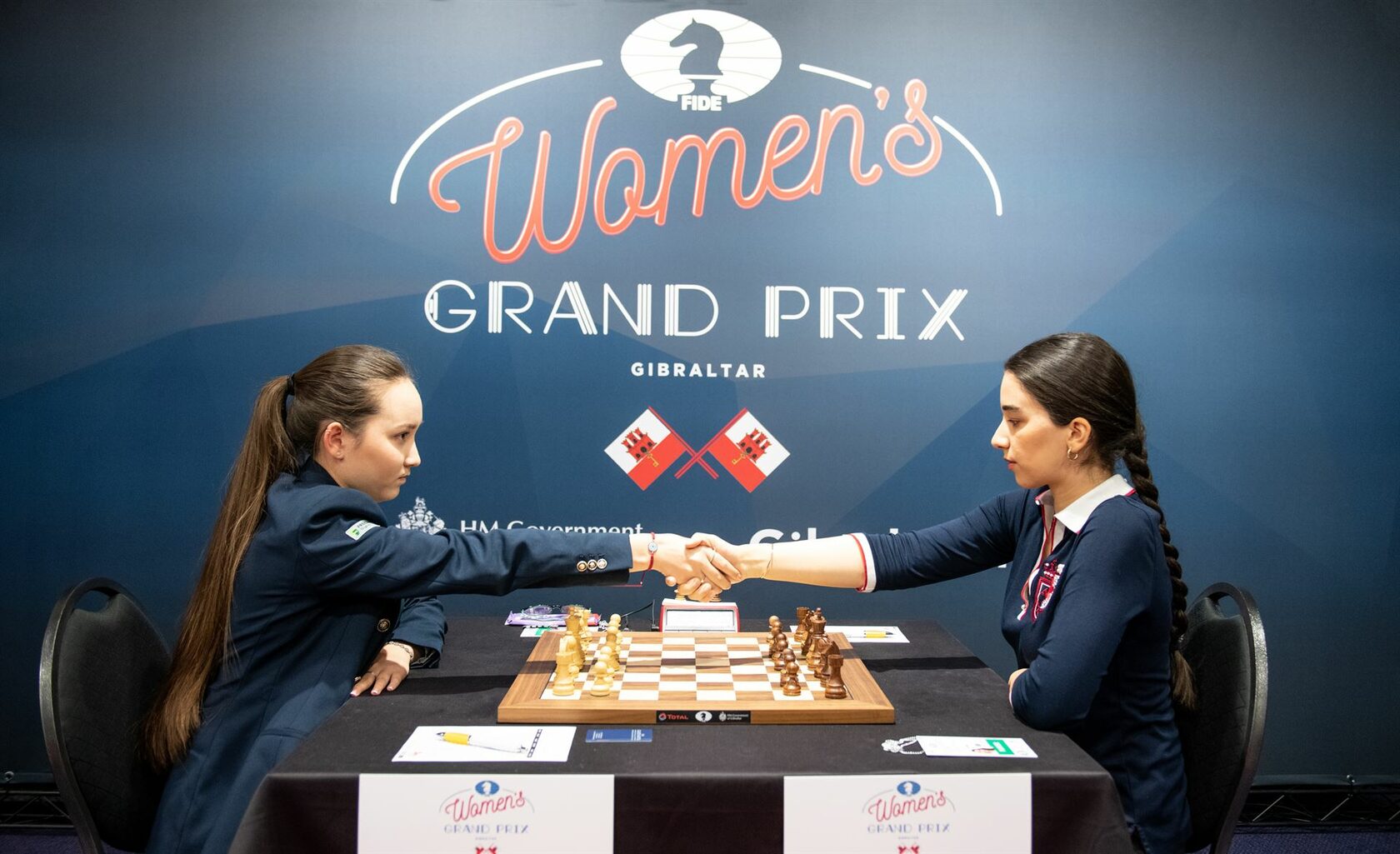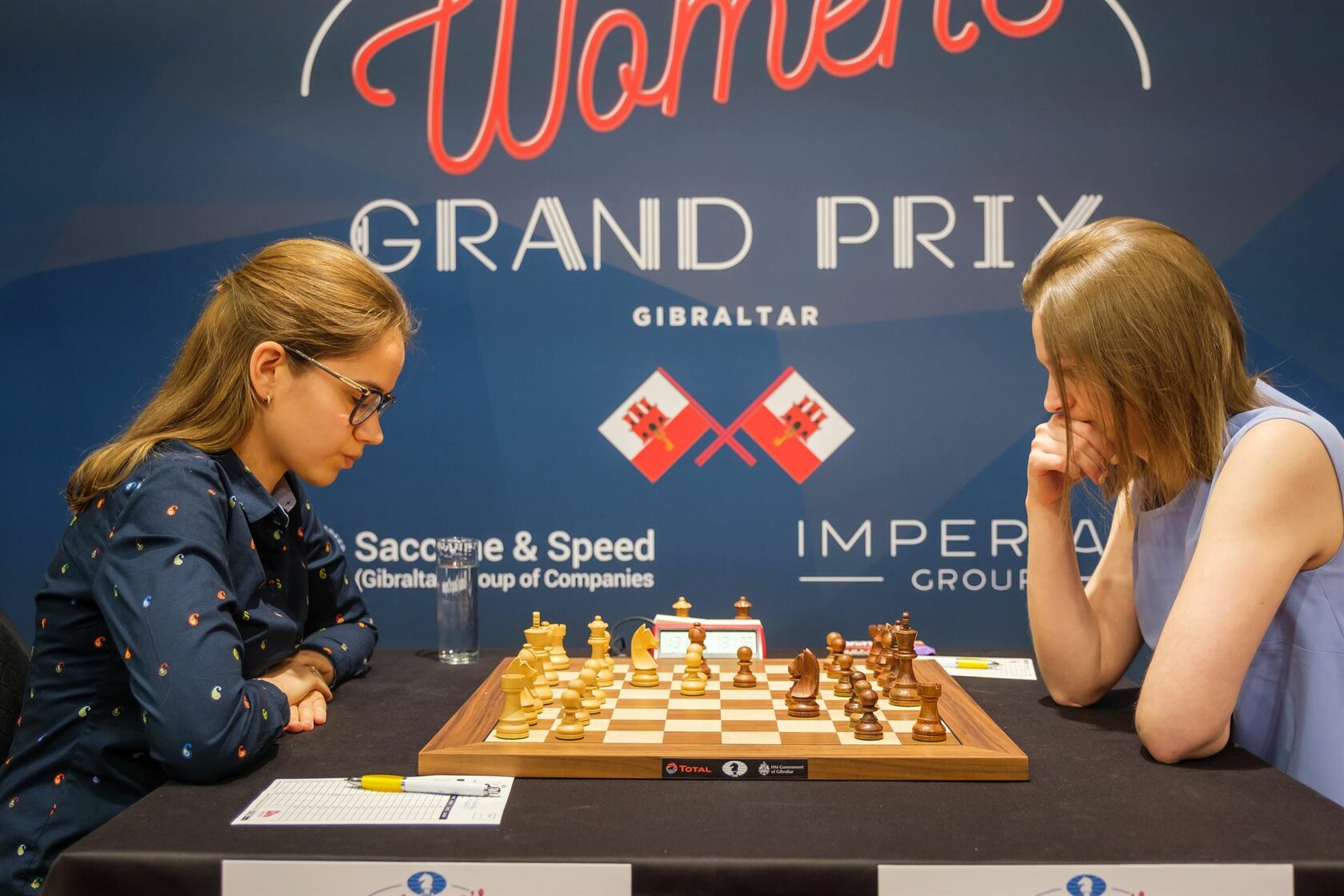The lead after round three of the Gibraltar leg of the FIDE Women’s Grand Prix, played at the Caleta Hotel on 24 May 2021, is shared by two players: overnight leader Zhansaya Abdumalik (Kazakhstan) drew with Gunay Mammadzada (Azerbaijan) to make her score 2½/3, while Kateryna Lagno won an all-Russian clash against Valentina Gunina to reach the same score. Three players, Gunay Mammadzada, Mariya Muzychuk (Ukraine) and Nana Dzagnidze (Georgia) are a further half point back, after another round of uncompromising chess which produced four decisive encounters and two hard-fought draws which lasted well into the second session. Everyone went all-in today: this is exactly the sort of chess we’ve been missing during the pandemic.
There was much interest in the meeting of the two players born in the year 2000, leader Zhansaya Abdumalik and Gunay Mammadzada who is just half a point behind her. Despite their youth, they have already been rivals for many years, having first met in the World Girls’ Under 8 Championship on 2008. Today they proceeded down a familiar line of Semi-Slav Meran theory until about move 16, when Gunay, playing Black, gradually assumed the initiative as White proved to have wasted time with 13 Ng5. Zhansaya, not wanting to succumb meekly, lashed out with a dramatic piece sacrifice, 21 Bxh6. Capturing it was possible, and seemed to find favour with engines, but the advantage of doing so is not obvious to the human eye as the resultant position only looks slightly better for Black. Gunay opted to retain more options but Zhansaya defended tenaciously. The game remained horribly complicated right up to the time control, with Gunay running her clock down to one second remaining before playing her 39th move. Still she retained an edge which led to the win of a pawn. However, that wasn’t the end of the story as she was unable to find a way past Zhansaya’s determined defences. A draw after a splendid fight, which reflected well on both players.

Alina Kashlinskaya had a nightmare start to the tournament, but fate smiled upon her last against Anna Muzychuk as the Ukrainian played into some of the Russian’s Classical Nimzo-Indian opening preparation. The consequence of 12...d4 and the subsequent exchange (for a pawn) sacrifice on d1 had all been carefully stress-tested in the Kashlinskaya/Wojtaszek opening laboratory before being inflicted on Anna. It meant leaving the white king in the centre, but Alina was able to develop her h-rook via h3 and g3 and increase the pressure on Black’s king. Anna tried to blunt the attack by offering the exchange back but White simply emerged a pawn to the good. Black tried to counter with a mating attack but Alina, after checking and double-checking her calculations (for fear of blowing another won position), mounted a final assault on Anna’s king. There’s still plenty of time to recover but this put a severe dent in Anna Muzychuk’s chances of challenging for a Candidates’ place.
Nana Dzagnidze and Dinara Saduakassova opened with a line of the English in which the queens disappear as early as move 8. Dinara’s new move 9...b6 steered the game away from a line disputed by Levon Aronian and Maxime Vachier-Lagrave a couple of times. Though even for much of its course, the pawns were imbalanced on both sides of the board and it became a battle to see who could squeeze the most positional juice out of the structure in Magnus Carlsen style. During the post-game interview Nana said she felt confident about her chances of exploiting her well-placed kingside pawns. That said, had Dinara played 33...Bd7, Nana wasn’t entirely sure of the way to take advantage of her extra kingside pawn (with Black’s extra queenside pawn having few prospects of undoubling). Thereafter Black soon succumbed.

Elisabeth Paehtz versus Mariya Muzychuk was another Classical Nimzo-Indian, with Elisabeth as Black obtaining some early pressure against White’s d-pawn. Mariya’s reaction to this, 15 Nh4 looked quite outlandish, but it proved its worth subsequently as Mariya gained some compensation for the pawn. Indeed, White soon became the player with an extra pawn herself. However, it came down to a queen endgame in which White was unable to make real progress with her extra pawn. Another draw and a real fight, albeit less entertaining for the spectators than the Abdumalik-Mammadzada confrontation.
Valentina Gunina played an unusual line against Kateryna Lagno’s choice of King’s Indian Defence... at least, that’s what I thought until I checked a database and discovered that a good number of modern GMs have been experimenting with these very same ideas. Including Nepomniachtchi. (I suppose it goes to show that my own concept of what is usual in this defence is about fifty years out of date.) But I wasn’t impressed and neither, evidently, was Kateryna Lagno as she secured a comfortable, flexible black set-up quite quickly. More seriously, Valentina played 18 b4 rather too quickly and Kateryna exploited this with 19...Ra3 with a lateral attack along the rank. 20 e5 worsened the situation and White had to give up a knight in return for a pawn on the seventh and some tactical tricks. Kateryna proceeded to defuse all the tricks and cashed in her extra material to win, thus moving alongside Zhansaya as co-leader.
Irina Bulmaga against Antoaneta Stefanova began life as a Scotch Opening. With the queens off and the pawns balanced on either side, a draw seemed the likeliest prospect, and remained so for much of the game, though both players strove to be positive and try to win. Irina, with White, seemed to preserve what little advantage there was as a result of having her king nearer the kingside action. Consequently, Black’s moves were a little harder to find. Eventually Antoaneta went astray, according to analysis engines, on move 55 when 55...Kd7 would have kept her within sight of a draw, while everything else lost. But it looks like a desperately hard ‘only move’ for a human to work out, so Antoaneta will be too experienced and phlegmatic to reproach herself for missing it. A very fine win for Irina, who told us later that she had never won a classical game against Antoaneta previously.

Round 3 Results
I. Bulmaga (0) 1-0 A. Stefanova (1½)
Z. Abdumalik (2) ½-½ G. Mammadzada (1½)
M. Muzychuk (1½) ½-½ E. Paehtz (1)
N. Dzagnidze (1) 1-0 D. Saduakassova (0)
A. Kashlinskaya (0) 1-0 A. Muzychuk (1)
V. Gunina (1) 0-1 K. Lagno (1½)
Crosstable after Round 3
(in draw order - superscript characters indicate colour and round number)
